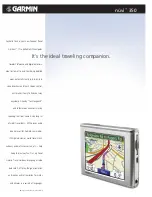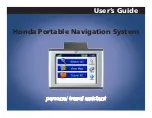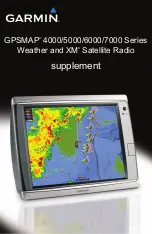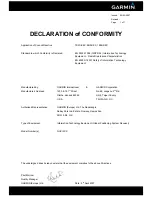
12-40
Garmin GTN 725/750 Pilot’s Guide
190-01007-03 Rev. D
Foreword
Getting
Started
Audio &
Xpdr Ctrl
Com/Nav
FPL
Direct-To
Proc
Charts
Wpt Info
Map
Traffic
Terrain
Weather
Nearest
Services/
Music
Utilities
System
Messages
Symbols
Appendix
Index
Weather
Mode
Color
GWX 68 Radars
GWX 70 Radars
3rd Party
Radars
Approximate
Intensity
Approximate
Rainfall Rate
(in/hr)
Approximate
Intensity
Radar Return
Level (see
radar docu-
mentation
for details)
BLACK
< 23 dBZ
< .01
< 23 dBZ
0
GREEN
23 dBZ to < 33 dBZ
.01 - 0.1
23 dBZ to < 33 dBZ
1
YELLOW
33 dBZ to < 41 dBZ
0.1 - 0.5
33 dBZ to < 41 dBZ
2
RED
41 dBZ to < 50 dBZ
0.5 - 2
> 41 dBZ
3
MAGENTA
50 dBZ and greater
> 2
Turbulence Detection
4
Table 12-5 Precipitation Intensity Levels
12.3.5.2 Thunderstorms
Updrafts and downdrafts in thunderstorms carry water through the cloud.
The more severe the drafts, the greater the number and size of the precipitation
droplets. With this in mind, the following interpretations can be made from what
is displayed on the weather radar. Avoid these areas by an extra wide margin.
• In areas where the displayed target intensity is red or magenta (indicating
large amounts of precipitation), the turbulence is considered severe.
• Areas that show steep color gradients (intense color changes) over thin bands
or short distances suggest irregular rainfall rate and strong turbulence.
• Areas that show red or magenta are associated with hail
or turbulence, as
well as heavy precipitation. Vertical scanning and antenna tilt management
may be necessary to identify areas of maximum intensity.
Along squall lines (multiple cells or clusters of cells in a line), individual cells
may be in different stages of development. Areas between closely spaced, intense
targets may contain developing clouds not having enough moisture to produce a
return. However, these areas could have strong updrafts or downdrafts. Targets
showing wide areas of green are generally precipitation without severe turbulence.
Irregularities in the target return may also indicate turbulence, appearing as
“hooks,” “fingers,” or “scalloped” edges. These irregularities may be present in
green areas with no yellow, red, or magenta areas and should be treated as highly
dangerous areas. Avoid these areas as if they were red or magenta areas.
Summary of Contents for GTN 725
Page 553: ......















































